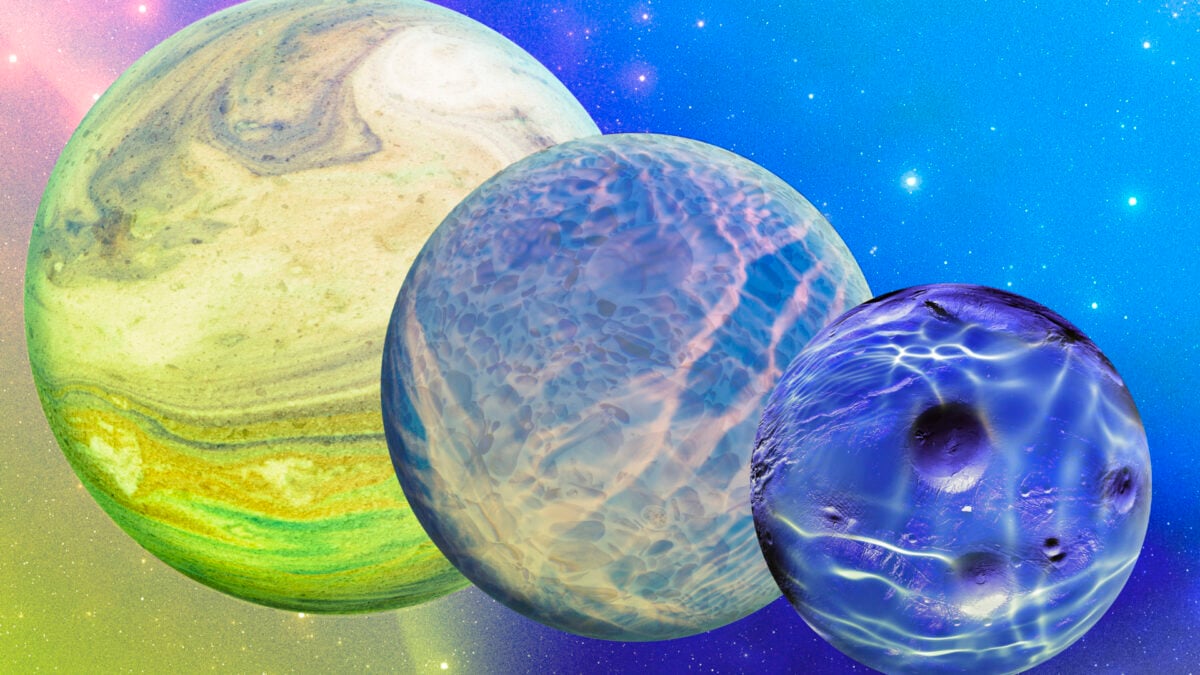How Alien Life Could Exist Without Water

The search for alien life usually hinges on finding the same conditions that sustain life on Earth. But what if aliens don’t need the same things that we need to survive? A new proposal tackles this question for water—arguably one of the most important factors in the search for alien life.
Intriguing new research from MIT proposes that liquids are what’s important for extraterrestrial habitability, and not just water. The new research specifically focuses on ionic fluids—substances that planetary scientists believe could form on the surfaces of rocky planets and moons. Ionic liquids are highly tolerant to high temperatures and low pressures, allowing them to remain in a stable liquid state that’s potentially friendly to biomolecules.
If confirmed, the proposal, published August 11 in Proceedings of the National Academy of Sciences, would dramatically expand what’s considered the “habitable zone” among known exoplanets. By current standards, the habitable zone is defined as the band within planetary systems in which liquid water can remain stable on the surface. When it comes to life, we’re understandably biased towards water; all life as we know it depends on it.
“We consider water to be required for life because that is what’s needed for Earth life,” Rachana Agrawal, study lead author and a postdoctoral researcher at MIT, told MIT News. “But if we look at a more general definition, we see that what we need is a liquid in which metabolism for life can take place.”
Originally, the researchers were studying the toxic, gassy atmosphere of Venus and whether such conditions could support extraterrestrial life. The planet is shrouded in clouds of sulfuric acid, a common byproduct of volcanic activity on Earth and, presumably, on other rocky planets. While experimenting with different ways to extract organic compounds from sulfuric acid, the team noticed that each time, “a stubborn layer of liquid always remained,” they explained.
“From there, we took the leap of imagination of what this could mean,” Agrawal said. “Sulfuric acid is found on Earth from volcanoes, and organic compounds have been found on asteroids and other planetary bodies. So, this led us to wonder if ionic liquids could potentially form and exist naturally on exoplanets.”
For the study, the researchers explored how ionic liquids could form naturally. (Earth’s ionic liquids are largely synthesized for industrial purposes; the only natural instance is the venom mixture from two very specific species of ants). They mixed various nitrogen-containing organic compounds with sulfuric acid on basalt rock, a common geological feature of rocky planets. This reaction occurred under the hot, low-pressure conditions resembling the weather at Venus or other rocky planets. They found that ionic liquid emerged from these experiments at temperatures up to 356 degrees Fahrenheit (180 degrees Celsius) and also at extremely low pressures.
“We were just astonished that the ionic liquid forms under so many different conditions,” Sara Seager, study co-author and an astrophysicist at MIT, told MIT News. The results also demonstrate the extraordinary persistence of ionic liquids compared to water, Seager explained. If “pockets” of ionic liquid could remain on a planet’s surface for millennia, they’d be the “small oases for simple forms of ionic-liquid-based life.”
“We just opened up a Pandora’s box of new research,” Seager added.
It’s wholly reasonable to begin the search for alien life using Earth and Earth-based life as our starting point. But when we consider something that could contradict these baseline assumptions, that’s when the most provocative, groundbreaking initiatives come to life.



- CỘNG ĐỒNG
- News
- Tech
- Food
- Causes
- Personal
- Art
- Crafts
- Dance
- Drinks
- Film
- Fitness
- Jogos
- Gardening
- Health
- Início
- Literature
- Science
- Networking
- Party
- Religion
- Fashion
- Sports
- Stars
- Xã Hội


